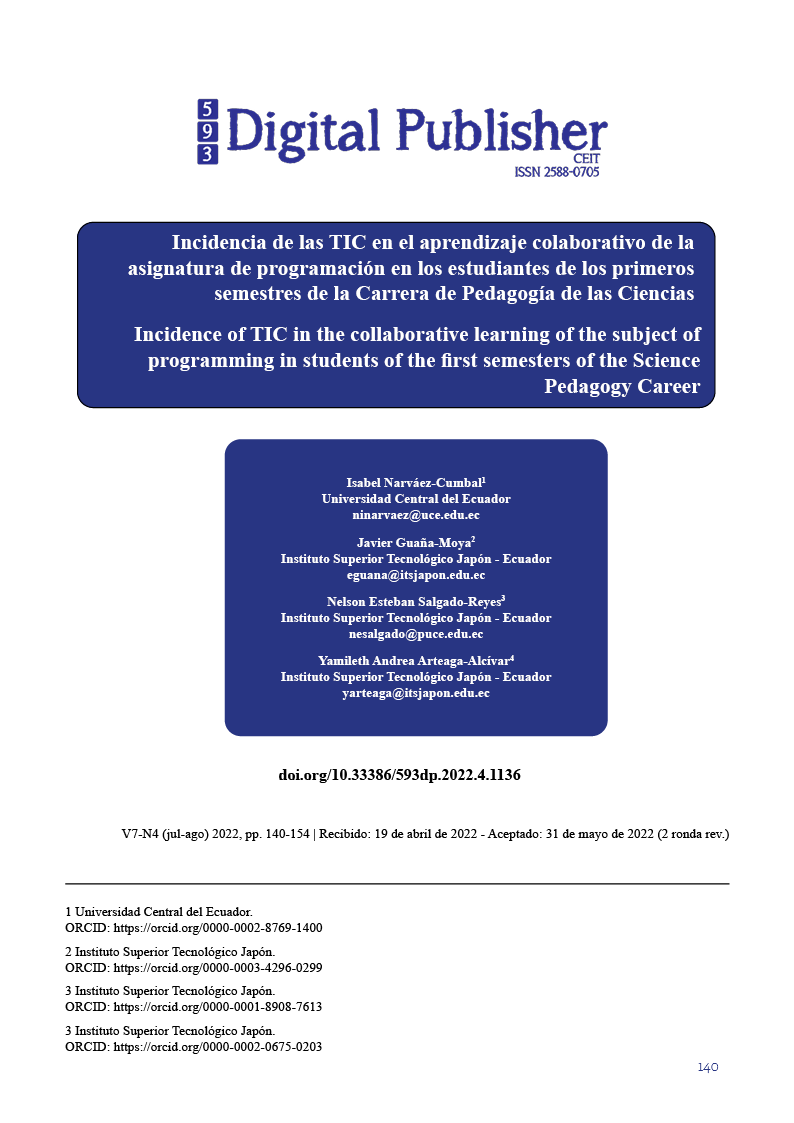Incidence of TIC in the collaborative learning of the subject of programming in students of the first semesters of the Science Pedagogy Career
Main Article Content
Abstract
Currently there are optimal results regarding the use of technology and collaborative learning in the teaching-learning process, as in several countries in Latin America and Europe technologies have already been implemented in the educational process both at middle and high school level, resulting in students with a high degree of critical thinking, research and collaborative spirit, as these tools have contributed positively in their autonomous and meaningful learning.
as a result, students with a high degree of critical thinking, investigative and collaborative spirit, as these tools have contributed positively in their autonomous and meaningful learning. In this sense, the objective of this research is to evaluate the incidence of TIC in the Collaborative Learning of the subject of Programming in the students of the first semesters of the Pedagogy of Experimental Sciences and Computer Science Career. For this purpose, research with a qualitative-quantitative approach was developed where surveys were applied to students and interviews to teachers in charge of the programming subject, as well as technological tools such as blogs, virtual educational platform (Uvirtual), Padlet and the WhatsApp social network. As results, positive responses were obtained from the students when working in teams and making use of the aforementioned ICT tools for the construction of group learning. The respective analyses showed that the use of ICT tools to perform tasks in work teams contributes positively to the generation of effective collaborative learning by students.
Downloads
Article Details

This work is licensed under a Creative Commons Attribution-NonCommercial-ShareAlike 4.0 International License.
1. Derechos de autor
Las obras que se publican en 593 Digital Publisher CEIT están sujetas a los siguientes términos:
1.1. 593 Digital Publisher CEIT, conserva los derechos patrimoniales (copyright) de las obras publicadas, favorece y permite la reutilización de las mismas bajo la licencia Licencia Creative Commons 4.0 de Reconocimiento-NoComercial-CompartirIgual 4.0, por lo cual se pueden copiar, usar, difundir, transmitir y exponer públicamente, siempre que:
1.1.a. Se cite la autoría y fuente original de su publicación (revista, editorial, URL).
1.1.b. No se usen para fines comerciales u onerosos.
1.1.c. Se mencione la existencia y especificaciones de esta licencia de uso.
References
Acosta, R. (2019). Uso de las Metodologías de Aprendizaje Colaborativo con TIC: Un análisis desde las creencias del profesorado. Digital Education Review, 309-322. Obtenido de http://greav.ub.edu/der/
Acosta, R., García, A., Martín, V., & Hernández, A. (2019). Uso de las Metodologías de Aprendizaje Colaborativo con TIC: Un análisis desde las creencias del profesorado.
Digital Education Review, 310-323. Obtenido de http://revistes.ub.edu/index.php/der/article/view/22259/pdf
Aragón, M. G., & Jiménez, Y. I. (2009). Diagnóstico de los estilos de aprendizaje en los estudiantes: Estrategia docente para elevar la calidad educativa. Revista de Investigación Educativa 9, 1-21. Obtenido de
https://www.redalyc.org/pdf/2831/283121714002.pdf
Arias, F. G. (2016). El proyecto de investigación. Introducción a la metodología científica. Venezuela - Caracas: Episteme.
Aveleyra, E. (2009). Foros de discusión: un estudio de su aplicación en cursos de física universitaria. Edutec, Revista Electrónica de Tecnología Educativa, (29), a116. doi:https://doi.org/10.21556/edutec.2009.29.448
Porcel, T. (2016). Aprendizaje colaborativo, procesamiento estratégico de la información y rendimiento académico en estudiantes de la Facultad de Educación de la Universidad Nacional Amazónica de Madre de Dios, 2015. Tesis Doctoral. Universidad Nacional Mayor de San Marcos. Lima, Perú.
Summa. (2016). Laboratorio de Investigación e Innovación en Educación para América Latina y Caribe. Obtenido de Aprendizaje Colaborativo/Cooperativo: https://www.summaedu.org/aprendizaje-colaborativo-cooperativo/
SUMMA. (2019). Laboratorio de Investigación e Innovación en Educación para América Latina y el Caribe. Obtenido de https://www.summaedu.org/aprendizaje-colaborativo-cooperativo/
Pontifica Univesidad Católica del Valparaiso. (01 de Enero de 2020). Recursos TIC. Obtenido de http://recursostic.ucv.cl/wordpress/index.php/essential_grid/padlet-perfil-docente/
Navarrete, G., & Mendieta, C. (2018). Las TIC y la educación ecuatoriana en tiempo de Internet: Breve análisi. Espirales, 14.
Ministerio de Educación. (s.f.). Ministerio de Educación. Obtenido de https://educacion.gob.ec/tecnologia-para-la-educacion/
Ministerio de Educación, M. (2017). AGENDA DIGITAL ECUADOR. Enfoque de la Agenda Educativa Digital.
Ministerio de Telecomunicaciones y de la Sociedad de la Información (MINTEL). (13 de 12 de 2018). MINTEL. Obtenido de https://www.telecomunicaciones.gob.ec/internet-dia-mas-usado-mundo/
Ministerio de Telecomunicaciones y de la Sociedad de la Información, M. (2016). Ministerio de Telecomunicaciones y de la Sociedad de la Información. Obtenido de https://www.telecomunicaciones.gob.ec/wp-content/uploads/2016/08/Plan-de-Telecomunicaciones-y-TI..pdf
Becerro, S. D. (2009). Plataformas Educativas, un entorno para profesores y alumnos. Revista Digital para profesionales de la enseñanza, 1-7. Obtenido de https://www.feandalucia.ccoo.es/docu/p5sd4921.pdf





